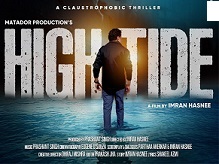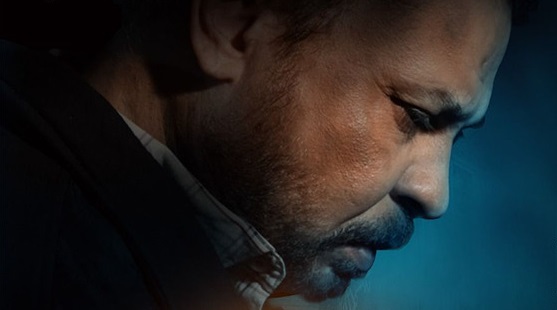|
|
||
|
Pro Tools
FILMFESTIVALS | 24/7 world wide coverageWelcome ! Enjoy the best of both worlds: Film & Festival News, exploring the best of the film festivals community. Launched in 1995, relentlessly connecting films to festivals, documenting and promoting festivals worldwide. Working on an upgrade soon. For collaboration, editorial contributions, or publicity, please send us an email here. User login |
High Tide, Review: Time and tide wait for one
High Tide, Review: Time and tide wait for one There was a film in which the main character is a psychopath who buries his victims alive. This was a European film, probably Austrian, that sent several chills down my spine when I saw it several decades ago. High Tide uses that basic premise, but builds an entirely new take around it. Three-quarters of the film are located in a box, the size of a large coffin, with a man trapped there. His plight evokes instant sympathy, for he has done nothing to deserve this fate. It also casts a claustrophobic spell, with the end getting nearer and nearer for the hapless victim. The one quarter is tacky and stereo-typical, and mars the overall effect somewhat, yet High Tide is a welcome departure from the average Hindustani film, and deserves to be seen. Mistaken for his namesake, a small-time company employee, Ashvini Kumar Budhel, is kidnapped as he goes to an ATM to withdraw some money, and drugged. He is then cast into a river, inside a box, with a torch and a mobile phone, having Rs. 27 as balance, for company. The intended victim was a Collector (a high-ranking government official who also oversees law and order issues in rural townships). The kidnappers are an insurgent, terrorist group, probably Naxalites, since the setting is in the state of Jharkhand, which has a substantial Naxalite problem. They want a file and a videotape, probably evidence of their crimes, and hope to get these two things through Ashvini. They establish contact with him through the phone and tell him that in his back pocket is a piece of paper, with the file number. If he calls up his Personal Assistant and asks him to hand over the file and video-tape to their man, he will be freed. Since Ashvini is not the Collector, he has no idea what they are talking about. He tells them that he is not a Collector, but a mere IT clerk, but they think he is bluffing. They warn him that unless he collaborates, he will die in that box. Ashvini tries to call the police and his wife, Bineeta, but cannot convince the police of his plight. First he cannot remember the number of his wife, so he dials two wrong numbers. The third time he gets through. To his misfortune, his mother answers, because his wife is not home, having left her mobile phone behind. Instead of listening to his problem, his mother pours out her own grievances. Now, several things are running out. The battery of the torch, the battery of the mobile, the balance on the mobile and the oxygen in the box. And with a little pothole to see for himself, he is sure that a watery grave awaits him in less than an hour. Largely the handiwork of Imran Hasnee—story, co-writer of the screenplay and dialogue (with Parthaa Akerkar), director and lead actor—Imran scores highest as actor. The story is a one paragraph plot, while there are some glitches in the screenplay and dialogue. As director, he is good while handling the scenes in the box, a little over-the-top while handling scenes in the outside world, and quite a lot over-the-top in scenes involving the terrorists and their leader. Yet, if the idea has come without the influence of the Austrian film, it has novelty that needs to be applauded. The screenplay makes us wonder why go through such a long ritual when you could have just put a gun to the Collector’s head and got the job done. Perhaps Hasnee realises this himself, no wonder he has the henchmen constantly rooting for the man’s blood. They remind him they they had killed a Superintendent of Police brutally, so why are they wasting time on Ashvini? Dialogue is often monotonous, with Ashvini speaking with not enough variation in tone on the phone and while talking to himself. The ring-leader is unduly given very long and philosophical lines (philosophy of the ruthless, cut-throat kind), which he delivers while walking or suddenly stopping, though the actor renders them very well. One scene, when a woman is shopping for a brassiere and Ashvini’s call gets connected to her, instead of reaching his wife, prompting a three-way conversation between the shop salesman, the lady and Ashvini, is in rank bad taste. Hasnee paints a real-bad picture of Jharkhand police, and here he gets the benefit of doubt. Those who have had no encounters, of the personal kind, with Jharkhand police might believe that they are like that, callous, presumptuous, tardy, crude and misogynistic. Towards the climax, the police send for divers and keep talking about what the divers have found or not found. But not diver is shown, nor what they have found is shared with the audience. It appears that they ran out of budget and decided to drop shooting those scenes altogether, or, they shot those scenes and they did not come up to expectations, and were snipped out. Cinematically, their inclusion was a must. When you show slack policemen, why not show dutiful divers and their cache? You do get the impression that if Ashvini had strongly indicated to his captors that he was not the Collector, right in the beginning, they would have considered setting him free. And all that claustrophobia leads nowhere, because you know that the hero will survive all odds, and time and tide will wait for one. There is a song in the end, with a singer and three musicians singing at the river bank. A certain gentleman, who should have walked towards them, walks away, for no reason.
There is little you can fault about 50 year-old Imran Hasnee, the actor (A Mighty Heart, Slumdog Millionaire, Pan Singh Tomar, The Dirty Picture, Yaara), except when he tries to improvise a bit, and there is nobody to tell him that he has fumbled, being the captain himself. Deglamourised, raw, earthy, and totally credible, he is one of the two pillars on which the film rides. The second pillar is his nemesis, the commander of the guerilla force, played by an actor who I have been unable to identify so far. The supporting cast consists of Dadhi R Pandey, Taruna Singh, Sudhakar Mani, Amit Sinha, Megha Joshi, Adnan Hasani, Manju Gautam and Navee Rautella. Who’s who will be posted on this page as soon as the info reaches me. Producer Prashant Singh is the music composer too. In High Tide, music acquires a character of its own. It is very loud, very often and builds up to a crescendo once too many times. Yet, when it works, it adds a lot to the ambience. Wonder how cinematographer Eugene D’Souza shot it: removing one side of the box and shooting all the shots from that angle, then doing the same for all other angles, as well as the top angle, or did he leave some of the stuff for the VFX guys. Either way, it must have been a challenging assignment, and will earn him kudos. Editor Prakash Jha lets the camera linger on Ashvini too long, often when nothing is happening. Except for this blemish, he has done a good job. The one song in the film comes at the very end, and is well-written by Shakeel Azmi, who uses rhymes like ‘maqbaraa’ and ‘mashvaraa’. But, sadly, the song is redundant. A claustrophobic thriller, High Tide scores medium on the impact-meter, but deserves a looksee nevertheless. Rating: **1/2 Trailer: https://youtu.be/DG9FpPmSTKE 20.10.2022 | Siraj Syed's blog Cat. : a mighty heart Adnan Hasani Amit Sinha Dadhi R Pandey Eugene D'Souza Imran Hasnee Jharkhand Manju Gautam Megha Joshi Navee Rautella Naxalites Pan Singh Tomar Parthaa Akerkar Prakash Jha Prashant Singh Shakeel Azmi Slumdog Millionaire Sudhakar Mani Taruna Singh The Dirty Picture Yaara Independent FILM
|
LinksThe Bulletin Board > The Bulletin Board Blog Following News Interview with IFTA Chairman (AFM)
Interview with Cannes Marche du Film Director
Filmfestivals.com dailies live coverage from > Live from India
Useful links for the indies: > Big files transfer
+ SUBSCRIBE to the weekly Newsletter Deals+ Special offers and discounts from filmfestivals.com Selected fun offers
> Bonus Casino
User imagesAbout Siraj Syed Syed Siraj Syed Siraj (Siraj Associates) Siraj Syed is a film-critic since 1970 and a Former President of the Freelance Film Journalists' Combine of India.He is the India Correspondent of FilmFestivals.com and a member of FIPRESCI, the international Federation of Film Critics, Munich, GermanySiraj Syed has contributed over 1,015 articles on cinema, international film festivals, conventions, exhibitions, etc., most recently, at IFFI (Goa), MIFF (Mumbai), MFF/MAMI (Mumbai) and CommunicAsia (Singapore). He often edits film festival daily bulletins.He is also an actor and a dubbing artiste. Further, he has been teaching media, acting and dubbing at over 30 institutes in India and Singapore, since 1984.View my profile Send me a message The EditorUser contributions |





























